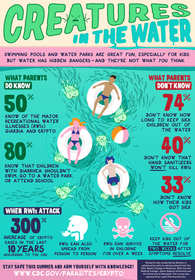BALTIMORE, MD--(Marketwired - May 6, 2015) - The season for fun, sun and swimming is quickly approaching. One key to enjoying this all-too-fleeting time is to stay healthy, but a new survey released today -- timed with National Swim Safety Month -- reveals that caregivers' knowledge about causes, prevention and treatment of recreational water illnesses (RWIs) is insufficient. According to the Centers for Disease Control and Prevention (CDC), one recreational water illness, Crypto, has increased by 300% in the last 10 years.
The new research was conducted by Nielsen in collaboration with an advisory board that included the Centers for Disease Control and Prevention and experts from Baylor College of Medicine, Weill Cornell Medical College, Johns Hopkins University and the University of Maryland. The survey, sponsored by Lupin Pharmaceuticals, queried more than 1,000 caregivers of children ages 1-12 years -- predominantly mothers -- to assess their knowledge of the parasitic infections Giardia and Cryptosporidium (Crypto) in kids. According to the CDC, Crypto and Giardia are the two most common protozoal pathogens. The main symptom of both diseases is gastrointestinal distress and infectious diarrhea. Key findings include:
- It's disruptive and distressing. Nearly 80 percent say the impact of their child's illness is extremely or somewhat disruptive to their families and more than half feel it's (either extremely or fairly) distressing to their child. The illnesses can upend summer camp plans, beach vacations and other adventures -- and disturb parents' work schedules.
- There's confusion and misinformation. Half of the respondents indicated they're aware of Giardia or Crypto parasites, and most (85%) know that children with diarrhea shouldn't swim, go to a water park, or attend school, however there's still a lot of confusion. Parents who think they're doing what they can to limit the spread of the disease may be mistaken. For example:
- Four in 10 think hand sanitizers can kill the parasites, which is not true.
- More than a third don't know how their kid(s) can catch the parasite.
- Most caregivers (74%) are unclear on how long they need to keep their sick children out of the water. Fewer than a third know that the CDC/AAP swimming guidelines indicate that children infected with Crypto need to be out of the water for two weeks after symptoms have resolved.
- Four in 10 think hand sanitizers can kill the parasites, which is not true.
- Most caregivers seek a doctor's help after four or five days. The majority (87%) of caregivers seek medical treatment for their child's diarrhea within seven days and most get help on day four or five.
Recreational water illnesses such as Crypto and Giardia can be contracted by children and caregivers in a variety of ways, including swallowing infected water and changing diapers. Crypto can survive in water for several days, even in properly chlorinated pools.
"Parents are familiar with recommendations on fevers, but when it comes to illness and water safety there's less clarity. In the case of RWIs, even if the symptoms have resolved the pathogens can be present for some time and could be transmitted to others. It's a good idea to play it safe and keep children out of the pool for a while even after they're feeling better," said Dr. Flor Munoz, a pediatric infectious disease doctor at Baylor College of Medicine and Texas Children's Hospital and a member of the survey advisory board. "Also, parents often think chlorine will kill all bacteria and parasites, but Crypto can survive in chlorinated water and hand sanitizers may not eliminate all pathogens. The keys: washing hands with soap and water, showering before swimming, and making sure children don't swim when sick."
More on the methodology
The survey was fielded by Nielsen in July, 2014 over 15 days and included responses from 1,048 caregivers. To qualify respondents had to be a primary caregiver of a 1-12-year-old child living in their household. That child had to have suffered from diarrhea at least once and the respondent had to be responsible for making the child's medical decisions.
Contact Information:
Media Contact
Kelsey BaRoss
kbaross@rosecomm.com
201-656-7178 ext. 214
